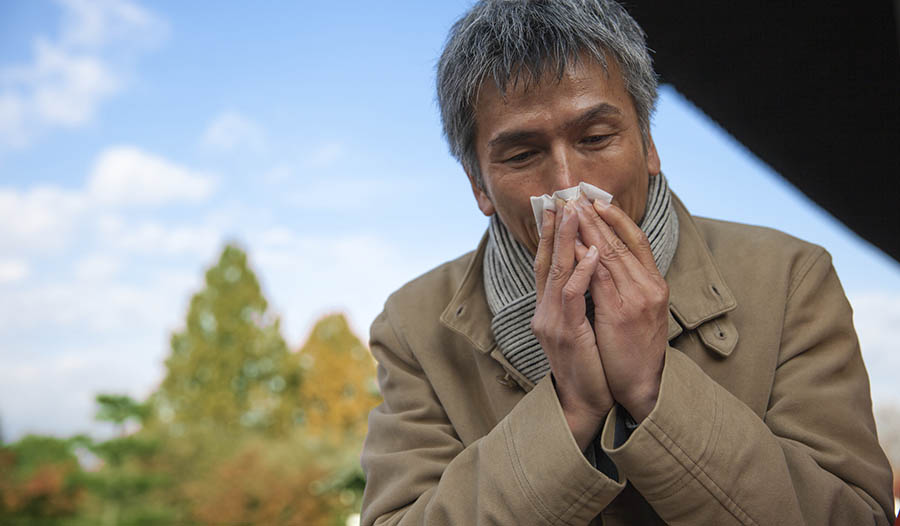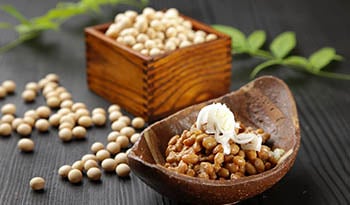Keep Your Sinuses Healthy
DISCLAIMER:This blog does not intend to provide diagnosis...
- In this article:
- Zinc
- Vitamin C
- Vitamin D
- Lactoferrin
- N-Acetyl Cysteine (NAC)
- Eucalyptus
- Xylitol Nasal Formula
- Frequent Use of Neti Pot or Other Sinus-rinsing Products.
- Steam Inhalation
- Probiotics

Millions of people worldwide visit their doctors each year with complaints related to their sinuses. "Sinus" is the term commonly used to describe anatomy that doctors refer to as paranasal sinuses. Sinuses are hollow “caves” in the human skull, which are essentially absent in newborns but develop fully by around age 8 and reach their full adult size by puberty.
Names of Sinuses
- Frontal sinus
- Sphenoid sinus
- Ethmoid sinus
- Maxillary sinus
Functions of Sinuses
- Decrease the weight of the skull
- Humidify the air
- Resonate sound during talking
- Make mucous
The sinus tissue generates a large amount of mucus each day, up to 1 pint (473 ml) to be exact.
Mucus entraps viruses, bacteria, fungi and dust particles so that they do not cause problems. Most of this will be swallowed into the stomach where stomach acid kills the pathogens. The mucus will then be digested and further broken in the intestinal tract, where it will be excreted in human waste. A small portion of the mucus will be removed by coughing or spitting.
Sinus Problems
Unfortunately, a lot can go wrong with sinus cavities. Frequently, they can become irritated by dust, pollen and air pollution, resulting in allergy or hay fever symptoms.
Sinuses can also become infected with viruses, bacteria, or even fungus. During the first seven to ten days of an infection, a virus is generally determined to be the cause, and antibiotics are not usually needed during this time. Nine in ten people with a viral sinus infection will recover without a pharmaceutical drug but frequently choose a more holistic approach instead.
Unfortunately, it is not uncommon for doctors to prescribe antibiotics during the first week of an infection. It is also common for patients to ask for a prescription during this time.
One in ten people may ultimately develop a secondary bacterial infection, usually the result of the virus infection having weakened the immune system. Should this occur, a doctor may prescribe antibiotics. Those with a sinus infection that does not improve with at least two courses of antibiotics should see a sinus specialist (known as an otolaryngologist ) and be evaluated for a fungal infection. Also, if an infection is ruled out, chronic sinus congestion could be due to food sensitivities. I recommend those being treated with antibiotics take a probiotic supplement to help protect the gut. It is not uncommon for antibiotics to kill off the good bacteria, which leads to an imbalance in the intestines, resulting in diarrhea.
Symptoms of a sinus infection:
- Nasal congestion
- Mucous discharge
- Facial pain
- Teeth pain
- Headache
- Sore throat
- Post nasal drip
- Cough
- Fever
Risk factors for chronic sinus infection:
- Tobacco use
- Second-hand smoke exposure
- Pollen allergies
- Air pollution, especially those living in areas of high automobile pollution
- Dairy sensitivities, which can cause sinus inflammation
- Wheat and gluten sensitivity, which can cause sinus inflammation
- IgA deficiency–a genetic condition which makes one more likely to develop chronic respiratory infections
- Suppressed immune system due to immune-suppressing drugs or Human Immunodeficiency Virus (HIV)
- Septal deviation
- Nasal polyps
In some, excessive mucous production occurs, which can result in chronic drainage of mucus down the back of the throat. Doctors call this post-nasal drip. It's a condition that affects millions, and not a day goes by that I do not encounter a patient with post-nasal drip symptoms.
Not everyone with sinus congestion will develop infections. Some simply have breathing difficulty and chronic allergy symptoms due to sinus inflammation.
Prevent Sinus Problems
Specific food avoidance, medications, minerals, vitamins, essential oils, and homeopathic remedies can all be considered as options to help one prevent allergies, nasal congestion, and ultimately infections of the sinus tract. Maintaining good sinus health is crucial to overall health and well-being.
Food Sensitivities Can Cause Sinus Congestion
From age 18 to 41, I suffered from chronic post-nasal drip, a sign that I had a chronic sinus problem. I was fortunate to not develop infections, but I had persistent sinus pressure, a chronic cough, and excessive mucus production, which resulted in a post-nasal drip. After realizing that dairy may be my problem, I decided to omit cheese from my diet. I had already eliminated cow’s milk while in college. After a few days of a cheese-free diet, I noticed my sinuses cleared up. For the first time in over 20 years, my post- nasal drip and cough went away. If I consume cheese, my symptoms would reappear for about three days.
I immediately started making the same recommendation to patients who had similar sinus issues. In addition, I recommended patients eliminate dairy, wheat (gluten), and corn for about 2-3 weeks. At that time, they could choose whether to re-introduce the food. The majority have improved by eliminating dairy while for others it was wheat and corn causing the issue. As a result, I have had numerous patients with chronic sinus symptoms improve and many have prevented recurrent infections.
Conventional Approach
Conventional medicine advises the following to help treat and prevent recurrent sinus infections and allergy related symptoms. In the scheme of things, both doctor and patient have a limited arsenal using this approach.
- Antihistamine medications such as loratadine (Claritin), cetirizine (Zytec) and fexofenadine (Allegra)
- Nasal steroids, including fluticasone (Flonase), mometasone (Nasonex) and others.
- Antibiotics
- Sinus surgery, a last resort for those with chronic sinus problems.
If a person has an upper respiratory infection, avoid being in their presence. If you are around someone with an upper respiratory infection, frequent hand washing with soap and warm water helps prevent infection. Avoid rubbing your eyes or nose with your fingers, especially if exposed after shaking somebody’s hand. Consider using a triclosan-free natural hand sanitizer, which may help reduce your risk of infection.
Alternative Treatments
Studies show use of complementary and alternative treatments for prevention of sinus problems and allergy control is common worldwide. Most sinus infections start off as a cold, or as doctors call it, an Upper Respiratory Infection (URI). Therefore, preventing a cold, which is caused by a virus, is crucial to preventing sinus infections. If a food allergy is involved, then that food should be avoided. Pollen allergies can also predispose an individual.
Zinc
Zinc is a mineral. Numerous studies show benefit in preventing the common cold, which can lead to a sinus infection. A 2016 study in the British Journal of Clinical Pharmacology concluded “common cold patients may be encouraged to try zinc lozenges for treating their colds” while a 2017 study concluded “common cold patients may be instructed to try zinc acetate lozenges within 24 hours of onset of symptoms.”
Starting zinc lozenges as soon as possible is advised. This important mineral should be kept in one’s medicine cabinet so it can be started as soon as symptoms are felt. Another 2017 study showed both zinc gluconate lozenges and zinc acetate lozenges are equally effective. A dose of at least 30 mg is recommended.
Vitamin C
Vitamin C, also known as ascorbic acid, has been recommended to help prevent the common cold for decades. Humans have a genetic mutation which makes us unable to make ascorbic acid. A 2014 study showed that vitamin C could reduce risk for developing a cold and also reduced the duration of the cold when compared to placebo (sugar pills). Other studies showed those under “physical stress”, we're more likely to benefit from vitamin C and cold prevention. Reduced respiratory infections result in fewer sinus infections.
Vitamin D
Low levels of vitamin D have been shown to be associated with increased risk for viral infections and sinus polyps, both of which increase one’s risk of developing a sinus infection. Optimizing vitamin D is a good way to prevent this. Most need 2,000 to 5,000 IU daily of vitamin D. Read more about the health benefits of vitamin D.
Lactoferrin
Lactoferrin is a protein which has both antibacterial and antifungal properties according to studies. This protein is usually found in the tissue of the sinus passages. For those with chronic sinus infections, supplementing with 300 mg daily may be helpful.
N-Acetyl Cysteine (NAC)
NAC is a supplement which can help those with chronic sinus infection break down mucus. NAC can be taken one to three times per day. The max daily dose is 1,800 mg.
Eucalyptus
Eucalyptus has been used for centuries as a natural nasal decongestant. Some use it as an essential oil and mix it with a diffuser to help with chronic sinus inflammation.
Xylitol Nasal Formula
Xylitol is a non-absorbable sugar. When used for chronic sinusitis, it can help treat current infections and help prevent additional bacterial infections. A 2012 study in Laryngoscope concluded “Xylitol in water is a well-tolerated agent for sinonasal irrigation. In the short term, xylitol irrigations result in greater improvement of symptoms of chronic rhinosinusitis as compared to saline irrigation”. In other words, a xylitol nasal spray should be considered.
Frequent Use of Neti Pot or Other Sinus-rinsing Products.
Nasal and sinus rinsing goes back to ancient India and is used in Ayurvedic medicine. A 0.9% nasal saline solution can be inserted into the nostrils using a mist, spray or neti pot technique.
A 2009 study concluded “normal saline nasal irrigation improves…Quality of Life and decreases acute sinusitis symptoms. Nasal irrigation is an effective adjunctive treatment for pediatric acute sinusitis...”.
A 2012 study of children showed that when nasal irrigation was used, the children were less likely to need prescription allergy medications. Overall, the irrigation was well tolerated. Lastly, a 2012 study of adults also showed benefit in preventing sinus infections in those who used nasal saline irrigation.
Steam Inhalation
Steam inhalation, 3-5 times per day can be helpful for a person with symptoms. This can be done taking a hot shower or by placing a warm towel over your head or breathing warm air from a warm air humidifier.
Probiotics
Probiotics are an up-and-coming treatment for chronic sinus disease. A 2016 study in a popular allergy journal concluded that nasally introduced probiotics could help chronic sinus problems. There are a lot of studies demonstrating the importance of a healthy gut microbiome and its role in overall health. Evidence from a 2017 study suggested that “an unhealthy gut increases the risk for sinus problems and inflammation in the sinus passage”. Therefore, supplementing with at least 5 billion units of probiotics daily is advised.
Homeopathic Remedies
There are several homeopathic remedies on the market which show promise based on user feedback. These should also be considered.
Lastly, one has a lot of tools available to help them prevent upper respiratory infections, chronic allergies and sinus problems. Maintaining good sinus hygiene is crucial to prevent misery, illness, missed work and school days. A healthy diet and consuming the appropriate supplements can play an important role.
References:
- http://www.healthline.com/human-body-maps/sinus-cavities-sinuses
- Br J Clin Pharmacol. 2016 Nov;82(5):1393-1398. doi: 10.1111/bcp.13057. Epub 2016 Jul 28.
- Open Forum Infect Dis. 2017 Apr 3;4(2):ofx059. doi: 10.1093/ofid/ofx059. eCollection 2017 Spring.
- Nutrients. 2014 Jul 9;6(7):2572-83. doi: 10.3390/nu6072572.
- Laryngoscope. 2008 May;118(5):895-901. doi: 10.1097/MLG.0b013e31816381d4.
- Am J Rhinol Allergy. 2014 May-Jun;28(3):244-8. doi: 10.2500/ajra.2014.28.4036.
- Int J Pediatr Otorhinolaryngol. 2012 Apr;76(4):583-8. doi: 10.1016/j.ijporl.2012.01.022. Epub 2012 Feb 11
- Am J Rhinol Allergy. 2016 Nov 1;30(6):202-205. doi: 10.2500/ajra.2016.30.4372.
- Otolaryngol Clin North Am. 2017 Feb;50(1):29-47. doi: 10.1016/j.otc.2016.08.004.

 By Dr. Eric Madrid, M.D.
By Dr. Eric Madrid, M.D.


